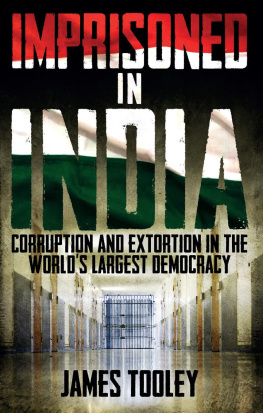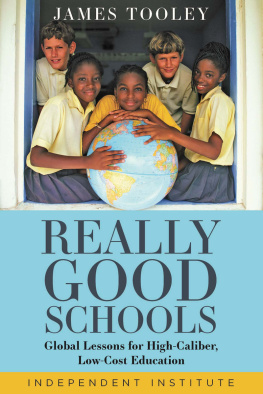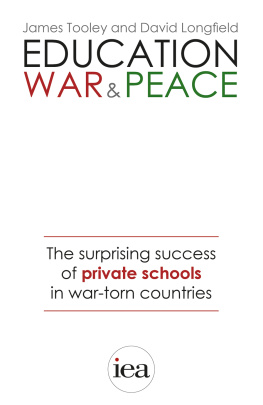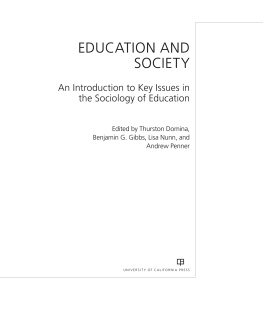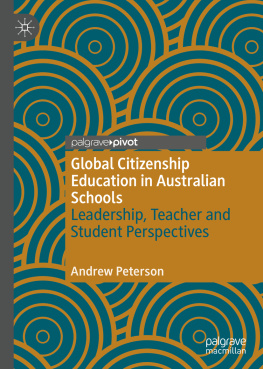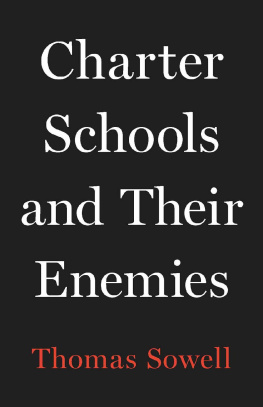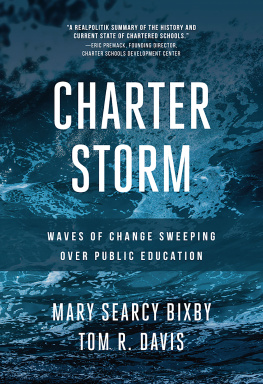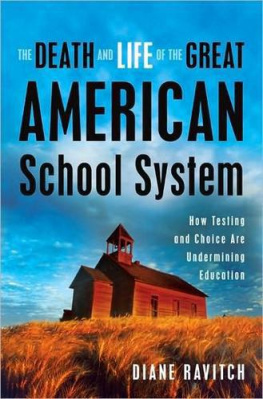From Village School to Global Brand
Changing the World Through Education
From Village School to Global Brand
Changing the World Through Education
James Tooley

First published in Great Britain in 2012 by
Profile Books Ltd
3a Exmouth House
Pine Street
Exmouth Market
London EC1R 0JH
www.profilebooks.com
10 9 8 7 6 5 4 3 2 1
Copyright SABIS 2012
The moral right of the author has been asserted.
All rights reserved. Without limiting the rights under copyright reserved above, no part of this publication may be reproduced, stored or introduced into a retrieval system, or transmitted, in any form or by any means (electronic, mechanical, photocopying, recording or otherwise), without the prior written permission of both the copyright owner and the publisher of this book.
A CIP catalogue record for this book is available from the British Library.
ISBN: 978 1 84668 545 3
eISBN: 978 1 84765 792 3
Text design by Sue Lamble
sue@lambledesign.demon.co.uk
Typeset in Photina by MacGuru Ltd
info@macguru.org.uk
Printed and bound in Great Britain by Clays, Bungay, Suffolk
The paper this book is printed on is certified by the 1996 Forest Stewardship Council A.C. (FSC). It is ancient-forest friendly. The printer holds FSC chain of custody SGS-COC-2061

Contents
by Harry Anthony Patrinos
To Leila and Ralph
Foreword
THE GLOBAL COMMUNITY is rapidly approaching 2015, the year targeted for the achievement of the Millennium Development Goal of achieving universal primary education. But as we approach that important date, it is becoming apparent that too many children are not benefiting from education. Reaching the target requires innovative approaches, including the extension of access to high-quality education. Over the last decade in some of the poorest countries of the world, the growth in school places is coming from the private sector. Without this growth, the many benefits of schooling would not be experienced by the poorest. These benefits include the fact that on average another year of schooling raises an individuals potential earnings by more than 10 percent a year. More educated people have healthier lives. For the national economy, a more educated population tends to have a higher growth rate, a productive workforce, and lower levels of poverty.
Private sector involvement in education will continue to play a critical role in promoting access in under-served areas, leading innovation, responding to social demand, improving learning outcomes, and reducing costs while increasing efficiency.
SABIS is an excellent example of a private education provider that is fulfilling this urgent need. Moreover, SABIS has been engaged in the global education industry since long before the term was coined. SABIS traces its origins back to 1886. The organization has educated children in its home country of Lebanon for over a century, even through civil war. The remarkable journey that has brought SABIS to more than fifteen countries to date proves the companys commitment to education. The company went on to participate in one of the most important education innovations in the United States, charter schools, educating children in New Orleans, Louisiana, in the aftermath of Hurricane Katrina, among other states. The company has even opened schools in Kurdistan since the second Iraq war. SABIS not only predates the global industry, but also many present-day emphases, such as, among others: schools for the disadvantaged, schools as a conduit for rehabilitation and reconciliation in fragile environments, and schools as market solutions for social issues.
In this engaging and inspirational book, Professor Tooley presents the story of one of the most enduring and committed players in the education field. It provides a rich background to the company and its approach. The book documents the contributions of the company and shows how a private company contributes to the public good.
Harry Anthony Patrinos
Lead Education Economist
The World Bank
Introduction
A CROSS THE WORLD, education is being radically transformed with the resurgence of a vibrant private sector. Sometimes this transformation is in collaboration with governments as publicprivate partnerships (PPPs) are created to improve educational outcomes in public schools. In other places its a result of students or their parents embracing private educational opportunities, irrespective of whether or not governments are offering something similar.
A seasoned observer of such developments is Chris Whittle. In his provocative and inspiring book Crash Course: A Radical Plan for Improving Public Education, Whittle surveys the history of his own roller-coaster ride in educational entrepreneurship. He dreams of changing the education paradigm, challenging the shibboleths that hold back public education.
Whittle sees two important and related developments in education that are fundamental to this paradigm shift. First is the growth of chains of schools, which can afford to invest in R&D to create new and cost-effective educational designs. Second is the emergence of global education providers:
These schooling companies seemed to intuit the same thing: education should be a global service. The languages people spoke were different, but the process through which children learned was universal,
With big global education players emerging, the fundamentals of education will be transformed for the better.
This book is about one such global educational company, SABIS. Last year, SABIS was celebrating its 125th anniversary. I was asked to speak at the annual directors conference. Over dinner, the president, Carl Bistany, suggested the idea of writing a narrative account of the companys history and philosophy. The idea appealed to me because SABIS seemed to embody several features that had the potential to reveal interesting dimensions about the private sector in education.
First, SABIS is proudly, even defiantly, for profit even when its clearly against its interests to say so. But secondly, I heard that it was active in countries like Iraq, and in environments like inner-city New Orleans, where it explicitly set out to serve children in difficult places, with huge needs. Indeed, their website announces that it grew out of a village school serving girls in a place late nineteenth-century rural Lebanon where girls were usually denied schooling. Ive always been intrigued by the overlap between the profit motive in education and humanitarian outcomes. Could SABIS offer evidence of a profitable education business coinciding with a humanitarian vision, having beneficial outcomes for the poor?
Thirdly, the companys reputation is that it eschews much of what passes for progressive educational thinking. This contrarian approach interested me particularly as the company also seemed to embrace advanced technology to enhance learning. Could these apparently contradictory approaches be squared? I was fascinated to find out.
Finally, SABIS was clearly involved in a range of business models private schools, publicprivate partnerships and licensing modelsexploration of which would appear to have much to offer anyone concerned with the role of the private sector in education.
It must be said that SABISs geographical range also attracted me. A reviewer of my earlier book
Next page

